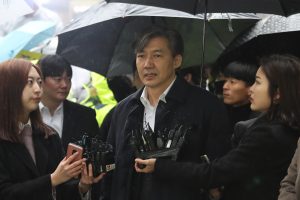A South Korean court on Friday rejected a request to arrest a key ally of President Moon Jae-in who is being investigated over allegations of corruption and power abuse, saying he was unlikely to flee or destroy evidence.
But in a rare comment on a suspect who has yet to be convicted, the Seoul Eastern District Court stated that the case of former Justice Minister Cho Kuk involved criminal acts of bad nature.
Prosecutors have claimed that Cho, while serving as Moon’s senior secretary for civil affairs in 2017, abused his power by blocking a government inspection into corruption allegations surrounding former Financial Services Commission Director-General Yoo Jae-soo, another official close to Moon’s ruling party.
Yoo, who later became vice mayor of the city of Busan, was arrested in November and indicted earlier this month over suspicion that he received around 49.5 million won ($42,600) in bribes from businesspeople during his time at the financial regulator.
Cho, once considered a future presidential contender for the ruling liberals, is being separately investigated over allegations of financial crimes and academic fraud surrounding his family that led to the arrests of his wife and other relatives and sparked huge protests that dented the popularity of Moon’s government.
“The nature of the criminal acts in this case is not good, but considering the suspect’s testimony and attitude during the hearing, the fact that his spouse has been arrested and is on trial on a different case, the fact that it’s difficult to determine that the gravity of the offense would warrant an arrest, and that the suspect has a fixed residence, it cannot be said there’s a reason for an arrest based on concerns of fleeing,” the court said in a statement.
Prosecutors didn’t immediately say whether they would make further requests for Cho’s arrest.
Moon’s office said it respects the court’s decision to reject the warrant and criticized prosecutors for what it described as an “unreasonable” attempt to arrest Cho. Blue House spokeswoman Ko Min-jung didn’t specifically comment on the court’s assessment of Cho’s alleged crimes.
“The [Blue House] office of the senior secretary for civil affairs has stated several times already that it carried out routine duties based on political judgment and decisions,” Ko said in a briefing.
Cho served as Moon’s justice minister for a month before resigning in October as the scandal grew, but he has firmly denied any legal wrongdoing.
“I have been enduring an endless investigation by the prosecution targeting my family. It has been a harsh time,” Cho told reporters on Thursday as he arrived at the court for a hearing on the prosecution’s warrant request.
He said he didn’t agree with the content of the prosecution’s warrant request, which accused Cho of abusing his power as a presidential official.
Prosecutors in October arrested Cho’s university professor wife, Chung Kyung-shim, who has been indicted over her suspected involvement in dubious private equity investments and faking materials to help their daughter’s admission to a medical school in Busan.
Cho’s resignation as justice minister came after huge crowds of his supporters and critics marched in South Korea’s capital for weeks, showing how the months-long saga deepened a political divide.
Moon’s liberal Democratic Party and his supporters have accused the prosecution of pushing an excessive investigation out of resistance to government reform plans for the justice system that had been laid out by Cho, which include curbing prosecutors’ investigative powers.
But the allegations surrounding Cho have clearly struck a nerve in a country that’s struggling to tackle widening inequality and brutally competitive school environments. The scandal damaged the reformist image of Moon, whose economic failures and faltering diplomacy with North Korea have also raised alarm for the liberals ahead of April’s parliamentary elections.
By Kim Tong-Hyung for The Associated Press.
































